Beard Papa: Cream on Broadway
With the Captain
routinely blazing one journalistic trail after another, a
puff piece profiling a trend of the day would likely be of
little interest to him. But this week he indulges, sampling
New York's hottest food fad from Japan: cream puffs. Loosen
that belt and get in line - the Captain is placing an order
for a box of six.
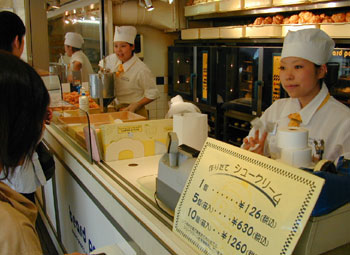 As
a line trickles out of this tiny shop onto Broadway's sidewalk,
a customer's order is called out from the register: "Ni
ko hairimasu!"
As
a line trickles out of this tiny shop onto Broadway's sidewalk,
a customer's order is called out from the register: "Ni
ko hairimasu!"
Two cream puffs, pipin' hot, as the Beard
Papa motto reads, are then plucked out of a nearby box
by a female Japanese staff member and tossed into a paper
bag. The other white
chef hat-wearing employees behind the counter continue
their tasks of dispensing the custard and retrieving baked
shells from the oven.
"The customer can watch the making and
baking. That is very attractive," says Koji Tsuda, general
manager in the international division of Muginoho
Co., Ltd., the Osaka-based restaurant company that created
the Beard Papa brand. A feeling that the puffs are being made
"just for you," the customer, as opposed to any
faceless person is the intention, he emphasizes.
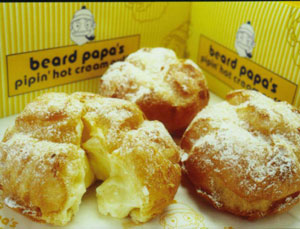 The
brand's policy is to ensure high quality ingredients served
at the peak of freshness. Even though the staff are Japanese,
riding on the coattails of the all-things-Japan boom that
has seen baseball players and cartoons rise to Godzilla-like
stature is not Beard Papa's motivation. Rather, it's entirely
about pushing cream puffs. And since its opening in March,
Beard Papa's new shop in New
York has had tens of thousands of cream puffs exit its
doors as a part of the latest New York food fad.
The
brand's policy is to ensure high quality ingredients served
at the peak of freshness. Even though the staff are Japanese,
riding on the coattails of the all-things-Japan boom that
has seen baseball players and cartoons rise to Godzilla-like
stature is not Beard Papa's motivation. Rather, it's entirely
about pushing cream puffs. And since its opening in March,
Beard Papa's new shop in New
York has had tens of thousands of cream puffs exit its
doors as a part of the latest New York food fad.
The cream puffs are unique in composition.
The shell is double-layered, including an outer piecrust and
an inner choux pastry. Custard, made from handpicked vanilla
beans, is mixed with whipped cream to form the filling. A
dash of powdered sugar tops it off.
"The concept is high quality at a low
price," beams public relations representative Eiko Takada
of the $1.25 price and Beard Papa's insistence on using only
natural ingredients.
Ensuring high quality at all times is vital
yet not simple. For example, even though the price of vanilla
beans, which Beard Papa culls from Madagascar, has quintupled
in the past five years because of weather problems, Beard
Papa has refused to make compromises. Competitors, however,
apparently do. "Some competitors use the less expensive
outer skin of the vanilla bean - instead of the inside - to
impart vanilla smell," scoffs Tsuda of these misleading
tactics. "The taste is totally different."
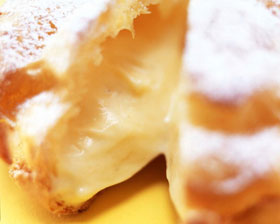 Shell
quality posed a problem in the early days. "We wasted
so many shells - they kept collapsing," says Tsuda, cupping
his hands together in the shape of a sphere and then simulating
an implosion. Not wanting to add artificial ingredients for
shell support, slight modifications to oven temperature and
the dough's water content were made to result in the rivuleted
and round pastries of today.
Shell
quality posed a problem in the early days. "We wasted
so many shells - they kept collapsing," says Tsuda, cupping
his hands together in the shape of a sphere and then simulating
an implosion. Not wanting to add artificial ingredients for
shell support, slight modifications to oven temperature and
the dough's water content were made to result in the rivuleted
and round pastries of today.
This "high quality at a low price"
concept is different from many of the Japanese pastry business
models, which often utilize a brand
name to justify a price much higher than that of Beard
Papa's. Sweets Forest, a pastry park in Tokyo's Jiyugaoka
district, has twelve famous pastry shops from all around Japan,
many of which offer their wares at four times that of Beard
Papa.
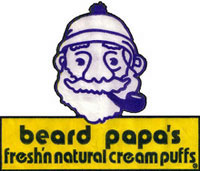 Positioning
stores near areas of high foot traffic, like train stations,
is seen as highly desirable in attracting office workers and
people out shopping, according to Muginoho's 2003 Outline
and Strategy report. Tsuda says that for the New York store
5,000 puffs on average were sold each day during March and
April - sales figures which roughly coincide with Beard Papa's
very popular store outside Tokyo's
Shibuya Station.
Positioning
stores near areas of high foot traffic, like train stations,
is seen as highly desirable in attracting office workers and
people out shopping, according to Muginoho's 2003 Outline
and Strategy report. Tsuda says that for the New York store
5,000 puffs on average were sold each day during March and
April - sales figures which roughly coincide with Beard Papa's
very popular store outside Tokyo's
Shibuya Station.
Beard Papa's scruffy, fatherly logo, complete
with watchman's cap and pipe, acts as a greeter, silently
encouraging customers strolling past the shops to pay a visit.
"The cap, pipe, and whiskers are supposed to remind one
of Santa
Claus," relates Tsuda. "He is loved by everybody.
We want our stores to be loved in the same way."
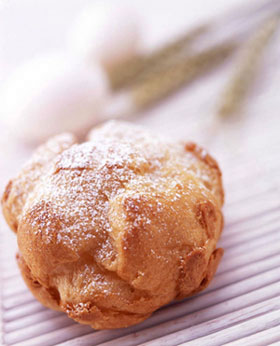 Competition
from new and unique sweet creations, such as Krispy Kreme's
dense donuts, does not worry Tsuda, nor does being a flash-in-the-pan.
"These new items are new, and not usual," he explains.
"But cream puffs have existed for a long history. It
is not going to fade out. We want New Yorkers to know that
we have the best taste. After they know that, then we are
going to bring a new menu."
Competition
from new and unique sweet creations, such as Krispy Kreme's
dense donuts, does not worry Tsuda, nor does being a flash-in-the-pan.
"These new items are new, and not usual," he explains.
"But cream puffs have existed for a long history. It
is not going to fade out. We want New Yorkers to know that
we have the best taste. After they know that, then we are
going to bring a new menu."
That menu will include some mango desserts
later this month. Other items, not even included on the Japanese
menu, are also being considered for later this year.
Since the opening of its first store five years
ago, expansion has been swift. By the time Beard Papa opens
its first shop on the West Coast in August or September -
as Tsuda expects - the total in existence will number around
300, an admirable amount considering only 170 existed in 2002.
Expanding into the American market at a time
when the average American's waist is expanding is not a deterrent
for Beard Papa.
Tsuda, who boasts having eaten five puffs during
his first Beard Papa experience, samples at least one puff
per day. His job requires him to travel to various stores
around Japan and the rest of Asia as a means of quality control.
"But look," he exclaims, reaching under his coat
and patting both sides of his stomach, "I am still slim."
Note: Ai Matsui contributed to this report
from the Tokyo Bureau. Cream puff photos provided by Muginoho.

